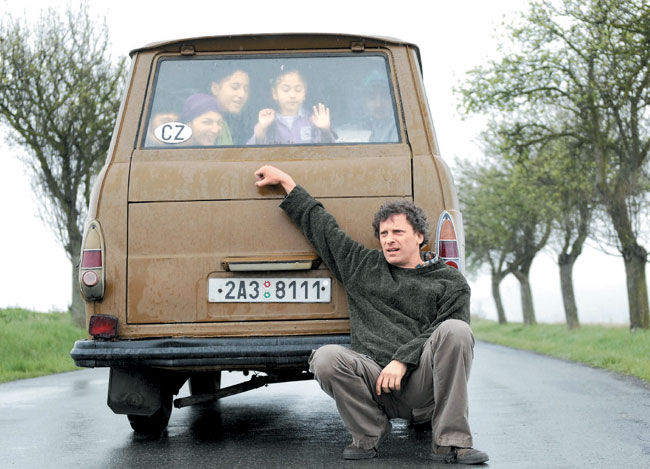El Paso (Zdenek Tyc, 2009): Czech Republic
Reviewed by Nicole Muhlethaler. Viewed at the Santa Barbara International Film Festival.

The inciting incident of El Paso is a car, and it shockingly hits us — or rather Vera’s husband — just a couple minutes in as he’s playing soccer with his son. We learn that Vera’s husband was the father of seven children, and his newly widowed wife, Vera, a strong, obstinate, and stubborn gypsy-Roma woman in her early thirties, is left the difficult task of raising them, along with the money for the rent they were already behind on paying. Incidentally, Vera’s family is evicted, landing her and the six children (the oldest ran off to live with her boyfriend) in a rundown one-bedroom apartment complete with security cameras in the halls, constant social services visits, and the degrading looks of their neighbors, shopkeepers, and apartment building managers.
Vera is obviously in a rut. Even the simplest of tasks is daunting; like feeding and clothing her kids and making sure they arrive safe at school. On top of this, she comes to find out she owes a phenomenal amount of money to her previous landlords, whom her late husband had allegedly not paid rent to for years; although Vera swears he always paid. In any case, she is thought to owe roughly $300,000 in debt and social services is honing in on her children, watching her every move and deeming her an unfit parent.
Monika, a beautiful, blonde lawyer, is drawn into Vera’s world when she decides to defend her in court, rejecting social services’ assessment that it would be in the children’s best interest to be taken into institutional care. Empathetic yet at the same time revolted by Vera’s lifestye (Monika must spray her wrist with perfume and smell it each time she enters and leaves Vera’s dirty apartment), she cannot get on Vera’s good side until she employs the help of a kind social worker, Kochta. Kochta is everything that Monika is not. He is friendly, playful with the kids, loving, and culturally sensitive — he knows how to bond with the family and gain their trust. Monika, on the other hand, is tense, serious, professional, and guarded — she is unwilling to sit and spend time with Vera and the kids, which is all Vera wants.
This movie, based on a true story, is moving, real, and pushes its audience’s ideas as to what constitutes a healthy family, and at what stage social services should intervene in the life of a family. Vera may smoke and drink beer around the kids, live at the poverty level, and keep a dirty, cramped house where the kids have no desks and study in bed with low lighting, but the children are happy, well-fed, and loved by their mother. In a particularly angering scene, the family is participating in a ritual in which they are recognizing their deceased father and husband. A large fire is burning in the living room as they pass around pictures of their father. Suddenly, social services agents burst in, not understanding the cultural importance of the ritual, and not caring.
One of the underlying themes of the film is the importance of culture. Vera’s family identifies with being impoverished, stepped on gypsy-Romas. Monika has no interest or understanding of this culture. During a meeting with Kochta, he asks her, “have you ever eaten with them?” It is here that she realizes how cold and unculturally sensitive she has been.
Monika and Vera cannot seem to meet in the middle. Vera is too headstrong and unwilling to listen to Monika’s sound advice, which frustrates Monika and leads to her overall coldness towards Vera. Vera, in turn, interprets Monika’s coldness as lying – she believes she is just as cold as all the biased social services workers and lawyers that have come before her. However, in a moment of truth when Monika almost drops the case, she lets down her guard and screams at Vera. Vera, for the first time, listens, her eyes wide, and says ” I didn’t think you knew how to tell the truth.”
Another important theme is the road of obstacles ahead for the family. Kochta takes the kids out for rides in a rundown van, which he allows the kids to decorate and paint. They love their road trips with Kochta, although they can never mount the top of a steep hill and are forced to get out and hitchhike once the van’s engine dies. This road trip symbolizes the many obstacles the family will encounter. However, in the end, they are finally able to cross over the hill, laughing, singing, and dancing in their seats, their van a brightly painted spectacle on the road. Monika wins her court case against social services, but this is just a tiny bump in the mountainous road of obstacles that lie ahead. The credits roll and we want to watch more. The story, however, is yet to be written – the family whom the movie is based on is still in limbo – their failure or success as a family having not yet been determined by the courts.
About this entry
You’re currently reading “El Paso (Zdenek Tyc, 2009): Czech Republic,” an entry on Student Film Reviews
- Published:
- 02.20.10 / 12am
- Category:
- Films, Santa Barbara Film Festival 2010
1 Comment
Jump to comment form | comments rss [?] | trackback uri [?]